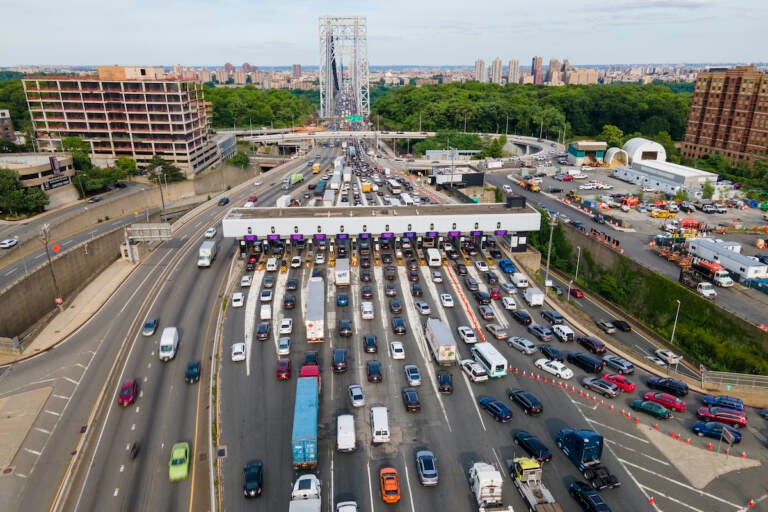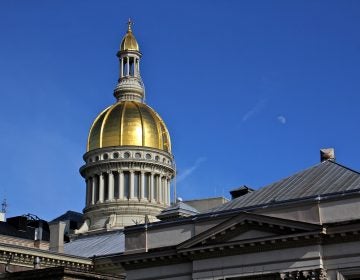N.J. wants to negotiate out-of-state income taxes for commuters
New Jersey officials have introduced bipartisan legislation that would give the state more leverage in a fight to end double taxation for state residents.

Traffic passes through the toll plaza at the George Washington Bridge in Fort Lee, New Jersey, on Friday, June 10, 2022. The busy bridge connecting New Jersey and New York City is moving to cashless tolls. Beginning in July, drivers paying cash tolls will have their license plates scanned and will be billed by mail. As part of the transformation, the tollbooths and islands will be demolished. (AP Photo/Ted Shaffrey)
New Jersey officials have announced bipartisan legislation they hope would give the state more leverage in negotiating income taxes for New Jersey residents who commute out-of-state for work or work from home.
Nearby places like New York, Connecticut, and Philadelphia apply what is known as a “convenience of the employer” rule to income taxes. That means, in most cases, if you live in New Jersey and work in any of those places, you’d be double taxed in New Jersey and the other location.
Currently, New Jersey does not use the same system, however, if the measure is enacted, the state would essentially create a reciprocal tax for out-of-state workers who reside outside of the Garden State.
The proposal, announced by Gov. Phil Murphy last week, would do three things: allow the state to tax workers who live in other places, provide a tax credit for New Jersey residents who sue other jurisdictions for double taxation and win, and establish a $10 million pilot grant program for companies that relocate to or reassign residents to offices in New Jersey.
“This is an issue that warrants no debate; on both sides of the aisle, we can all agree that we must protect our residents from unfair and inordinate taxation from other states,” said Murphy, in a statement last Thursday.
Micah Rasmussen, a political analyst and executive director of the Rebovich Institute for New Jersey Politics in Lawrence, said this would give New Jersey leverage in negotiating fair taxation for state residents.
“We are now going to play a little bit of hardball with [outside jurisdictions,] because we’re now going to say you work for a New Jersey company, you now have to pay New Jersey income taxes,” Rasmussen said. “And if you want it back, you’re gonna have to go back to your own state to Pennsylvania or New York, and you’re gonna have to ask them for a credit, if you don’t want to be double taxed.”
Rasmussen said elected officials have discussed solutions to double taxation for many years, and that an increase in remote work, spurred by the coronavirus pandemic, has reinvigorated legislative efforts.
“We’ve known this was a problem for a long time, but it’s a very tricky business to fix it. Because you can’t just fix it on your own,” Rasmussen said.
“New Jersey can’t just wave a magic wand and say, ‘well, you know, we’re gonna start collecting the right taxes, and people are gonna start paying taxes to us.’ No, because New York may have a different interpretation. And Pennsylvania may have a different interpretation, and still want to collect taxes on their sides of the river,” Rasmussen added.
Rasmussen said there’s a chance that officials in other states shrug off New Jersey’s move, even if their residents lobby for changes.
Senate minority leader Steven Oroho (R-Sussex) said he had ramped up calls to enact the measure since the start of the pandemic. He said he had also tried to get both the Christie and Corzine administrations to act on it.
In January, Oroho told WHYY News that it was part of GOP senators’ plan to make the state more affordable, and that New York raises an average of $4 billion dollars in income tax revenue from New Jersey employees each year.
“The money that we would collect goes into our property taxes, which we use for school aid and use for veterans benefits, for the senior tax relief program,” Oroho said.
New Jersey currently provides relief for residents by offering a tax credit for people who work out-of-state.
In late 2020, the Murphy Administration filed an amicus brief in the U.S. Supreme Court, supporting a New Hampshire challenge to a similar situation with Massachusetts. The Supreme Court decided not to take up the case.
Oroho introduced a similar measure in 2020 alongside Sen. Paul Sarlo (D-Bergen) that passed in the Senate unanimously, though the General Assembly did not vote on it.
“I think they felt more and more pressure from people when you start hearing stories of people who haven’t gotten into [New York City] for going on three years. And the fact that … you’re hearing from … people who were working from home,” Oroho said.
The longtime Republican lawmaker said he “appreciated” the Murphy Administration’s efforts in the court case, but added the state should have supported his proposal a few years ago. He also said he wants to discuss amendments he said would provide more direct relief for New Jersey taxpayers, like refundable credits.
WHYY is your source for fact-based, in-depth journalism and information. As a nonprofit organization, we rely on financial support from readers like you. Please give today.








